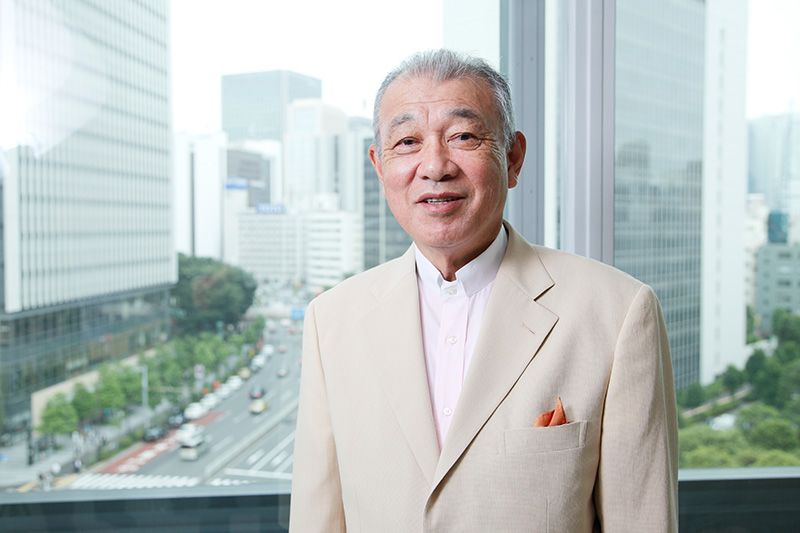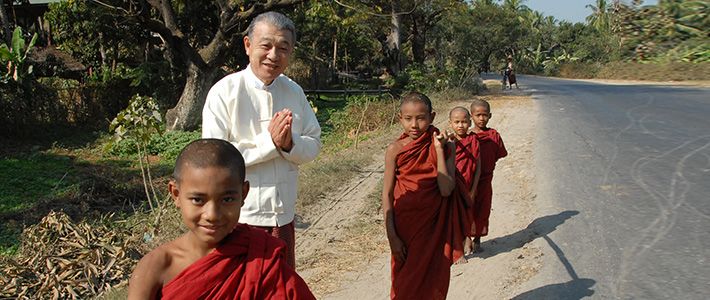
The Road to True Democracy in Myanmar
Politics- English
- 日本語
- 简体字
- 繁體字
- Français
- Español
- العربية
- Русский
Democracy Depends on Improving Ethnic Ties
INTERVIEWER The Japanese government recently appointed you its ambassador for the welfare of ethnic minorities in Myanmar. What sort of initiatives do you plan to pursue in that role?
SASAKAWA YŌHEI As you know, the eyes of the world have been on democratization in Myanmar ever since Thein Sein became president in March 2011. But the biggest challenge the country still faces centers on relations with ethnic minorities. Despite the centrality of this issue, however, other countries have only been preoccupied with penetrating the Myanmar market.
There are armed ethnic minorities who inhabit the mountainous border regions of Myanmar, and some of these groups are engaged in combat with the central government. True democracy will not come to Myanmar unless the central government, in the capital Naypyidaw, reaches a peace settlement with various ethnic minorities. Democratization will bring foreign resources to Myanmar, but if that process does not raise the standard of living, and the class divide widens further, then the frustrations of ethnic minorities will only get worse.
In April 2012, representatives from three of the Thailand-based organizations representing ethnic minority groups opposed to the Myanmar central government(*1) traveled to Japan for talks with the Ministry of Foreign Affairs. The representatives expressed their trust in the Japanese government and called on it to act as an intermediary for peace talks with the Naypyidaw government.
For many years the Japanese government has had no choice but to follow the US policies on Myanmar, but now Japan is beginning to provide substantial support for Myanmar, starting with the revival of its official development assistance for the country.
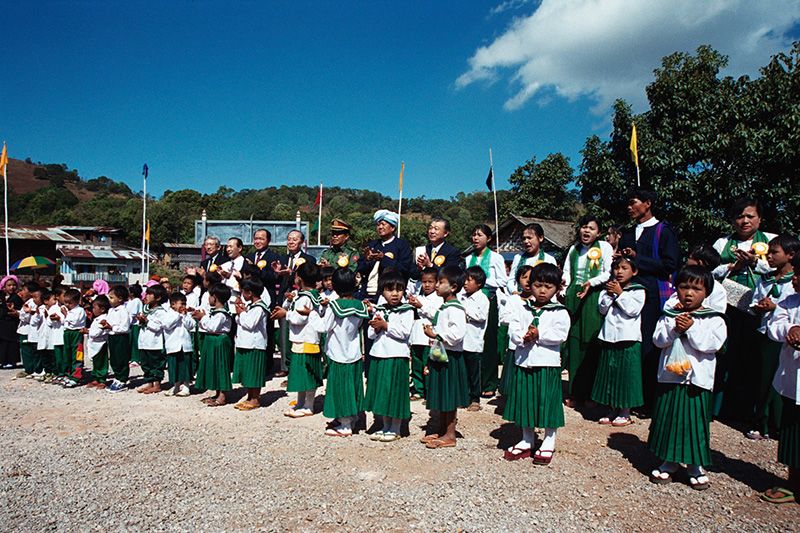 A ceremony to mark the opening of a new school built in the state of Shan in the north of Myanmar. (February 2002; photo: Nippon Foundation)
A ceremony to mark the opening of a new school built in the state of Shan in the north of Myanmar. (February 2002; photo: Nippon Foundation)
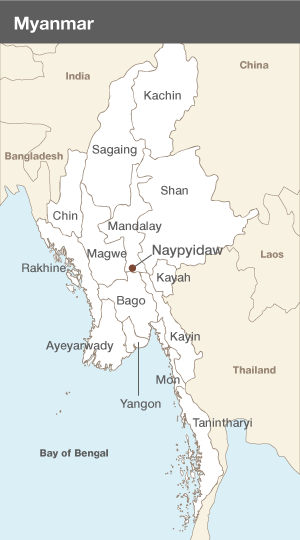 The Japanese government’s idea of appointing me ambassador stems, I think, from the success of a unique Nippon Foundation project for assisting ethnic minorities in Myanmar. Initiatives under this project include the construction of elementary schools and the distribution of medicine boxes [called okigusuri in Japanese] containing traditional medicines. The school construction, in particular, gives even ethnic minorities living in remote mountainous areas a sense that the central government’s democratization is bringing tangible results. In the state of Shan, for instance, inhabited by several ethnic groups, around 200 elementary schools have been constructed already under the project. And work is moving forward on the construction of 100 schools in the state of Rakhine, where religious conflict has been escalating.
The Japanese government’s idea of appointing me ambassador stems, I think, from the success of a unique Nippon Foundation project for assisting ethnic minorities in Myanmar. Initiatives under this project include the construction of elementary schools and the distribution of medicine boxes [called okigusuri in Japanese] containing traditional medicines. The school construction, in particular, gives even ethnic minorities living in remote mountainous areas a sense that the central government’s democratization is bringing tangible results. In the state of Shan, for instance, inhabited by several ethnic groups, around 200 elementary schools have been constructed already under the project. And work is moving forward on the construction of 100 schools in the state of Rakhine, where religious conflict has been escalating.
As a model, we can look to our past school-building efforts in Cambodia, around the time of peace talks in that country. Schools were built there in regions still inhabited by followers of Pol Pot, who were opposed to the central government in the capital, Phnom Penh. These inhabitants were impressed that the government managed to have schools built so quickly in their regions, and I’m proud that we seem to have contributed to the success of the Cambodian peace and reconciliation effort. I believe that the same sort of initiative can be effective in Myanmar with regard to improving relations with ethnic minorities.
In my role as ambassador, it will be important to listen carefully to the views of the ethnic minority leaders, now in exile in Thailand, particularly the leadership of the Karen people. There are various other ethnic groups, such as the Kachin, the Pao, and the Shan, but the longest-standing armed conflict involves the Karen people, many of whom have fled to Thailand. This July, in order to help build confidence between ethnic groups and the central government, I will travel to Thailand to meet with the ethnic minority leaders based there.
Talks with Aung San Suu Kyi
INTERVIEWER During your visit to Myanmar in December 2011, you had talks with President Thein Sein as well as the opposition leader Aung San Suu Kyi. What sort of things did you discuss with those two leaders?
SASAKAWA I might just be the only Japanese who is able to have a conversation with both of them. [Laughs] Similarly, I have had talks with the President of the People’s Republic of China and the Prime Minister of Taiwan. I think the reason I can converse with both sides in such cases is that, as a private citizen rather than a government official, my interlocutors can speak frankly, without worrying about my own political position.
Over the past ten years, in my capacity as the WHO goodwill ambassador for leprosy elimination, I’ve met the presidents of twenty-nine states and fifteen prime ministers. Diplomacy is not something that should be handled by governments alone, so I’m encouraged that Japan’s Ministry of Foreign Affairs is effectively employing people with my sort of background.
Talks between presidents or prime ministers tend to be stiff and formal affairs, because each leader has to bear the prestige of his or her country. But I’m just an individual, so the atmosphere can be much more relaxed, making it possible to engage in an in-depth discussion. This is, I think, one of the strengths of involving a private citizen in diplomatic initiatives.
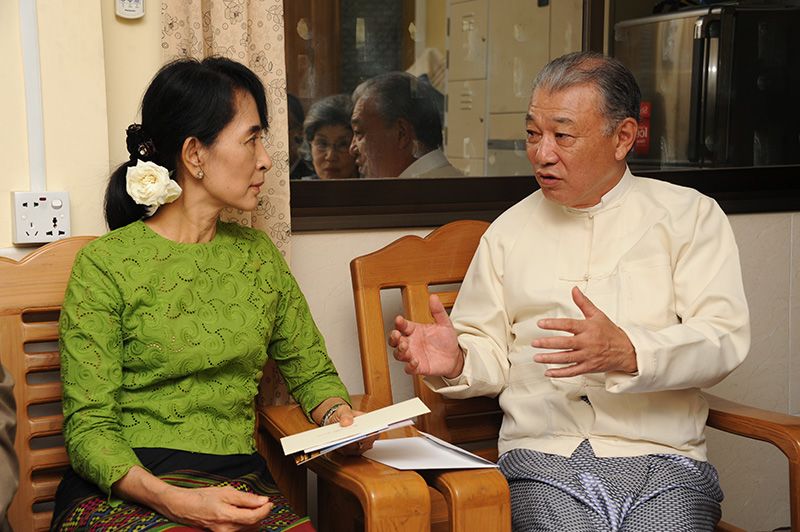 Sasakawa Yōhei talking to Aung San Suu Kyi during his trip to Myanmar in December 2011. (Photo: Nippon Foundation)
Sasakawa Yōhei talking to Aung San Suu Kyi during his trip to Myanmar in December 2011. (Photo: Nippon Foundation)
In my meeting with Aung San Suu Kyi, one of the points that came up was that Japan’s aid to Myanmar is lagging behind that of China and South Korea. I reassured her that, despite our late start, we would make speedy progress once we were up and running. And to reinforce this point I told her: “We’ll pull ahead in the end because the Japanese are adept at marathons.” She came right back, though, with a quick-witted response. “Actually, when it comes to marathons,” she said, “the Ethiopians are the best in the world.” [Laughs]
Another issue we discussed was the building of elementary schools and the introduction of medicine boxes to regions of Myanmar inhabited by ethnic minorities, and Aung San Suu Kyi was extremely interested in both initiatives. She told me she has had a keen interest over the years in the ethnic issue, as had her father, General Aung San, who is known in Myanmar as the “Father of the Nation.”
INTERVIEWER What sort of impressions do you have of Myanmar as a country?
SASAKAWA I think it's one of the Asian countries with the greatest affinity for Japan. Generally, Japan enjoys a positive image among Asian countries, but my sense is that Myanmar’s fondness for Japan is at least on par or even greater than found in other parts of the region.
This attitude may be influenced in part by the history of how the Japanese army’s “Minami Kikan” unit supported General Aung San’s war of independence. I saw evidence of this influence on my first visit Myanmar in 1999, when I was surprised to hear the Japanese command hofuku zenshin [crawl forward] used during a military drill that I was observing.
Meanwhile, Japanese of my generation have the fond memory of the rice sent from Myanmar after World War II, which helped Japan cope with a grave domestic food shortage. I can never forget this debt of gratitude that we have to Myanmar.
As for the people of Myanmar, they have a very calm, even-handed temperament, and many of them are devout Buddhists. My impression is that they are very much on the same wavelength as the Japanese people.
Cultivating Prosperity in Remote Mountain Areas
INTERVIEWER Along with contributing to the effort to settle the armed conflicts in Myanmar, do you have a policy in mind with regard to assisting ethnic groups there?
SASAKAWA I think that agriculture is crucial. In some parts of Myanmar rice can be grown two or even three times a year. For the country’s mountainous areas, though, I think the best-suited variety of rice is NERICA, or “new rice for Africa,” which is often utilized for aid programs in African nations; this is because it can be cultivated in dry fields. In addition to rice-related initiatives, it will also be important to expand Myanmar’s agricultural products with high added value.
In the past, the border area of Myanmar, Thailand, and Laos was known as the “golden triangle” for its illicit cultivation of narcotics. The Japanese government tried to help put an end to that cultivation by encouraging farmers to grow buckwheat instead, but the initiative was a complete failure. The problem was that, whereas buyers of narcotics were quite willing to travel to a village to make a purchase, buckwheat farmers could not hope to make a sale without transporting their produce to markets by themselves. And there was no way to transport the buckwheat that was grown in areas lacking a proper road infrastructure.
Moving forward, it will be necessary to cultivate the sort of agricultural products that can bring in steadily rising revenue, even for ethnic minorities living up in the mountains. One possibility I would recommend is the cultivation of medical herbs with high added value.
Just a moment ago I mentioned how the Nippon Foundation was distributing boxes containing traditional medicines. And large quantities of herbs are needed to produce those medicines. If farmers in the mountainous areas of Myanmar would grow such herbs, it would make it much easier for us to secure supplies for the medicine box project. We want to provide assistance to farmers in those areas who are interested in growing herbs. This would allow them to increase their own incomes and also use the medicines produced to take care of their own health. So the benefit would be twofold.
I intend to team up with a medical association in Myanmar to put in place a system for traveling clinics to provide medical services to ethnic minority communities. Also, in response to the casualties from the armed conflicts in the country, we are making preparations for the construction of schools for training people on how to make artificial limbs and for the creation of organizations that benefit the disabled.
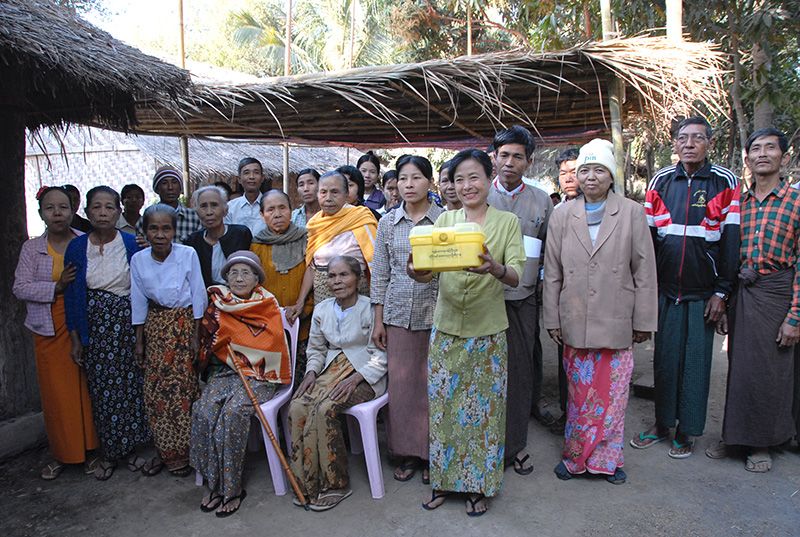 A “medicine box” (okigusuri) providing traditional medicines to residents of a village near the Myanmar capital Naypyidaw. (February 2009; photo: Nippon Foundation)
A “medicine box” (okigusuri) providing traditional medicines to residents of a village near the Myanmar capital Naypyidaw. (February 2009; photo: Nippon Foundation)
Risking Everything for a Peace Settlement
INTERVIEWER Finally, could you say a word about your mental attitude as you face the upcoming challenges as Japan’s ambassador for the welfare of ethnic minorities in Myanmar?
SASAKAWA My basic attitude is to risk everything personally for the sake of my mission.
In the course of my past efforts to eliminate leprosy, there were times when I ran the risk of contracting disease in the jungles of Africa, but this time around, in Myanmar, the situation involves armed groups of people. So it’s a job fraught with considerable risk. But, as the saying goes, nothing ventured, nothing gained. There is simply no way to resolve the problem of ethnic conflict in Myanmar without going into the danger zones. And I expect that I’ll need to visit those places any number of times.
It’s very significant that Japan is now taking the initiative to help resolve the conflict between the central government and ethnic minorities in Myanmar. In the past, other countries acted as intermediaries—such as Norway for the conflict in Sri Lanka and Finland with regard to the Aceh issue in Indonesia. Even though those situations occurred in Asia, Japan ended up being a mere onlooker. This passivity on the part of Japan has puzzled and frustrated other ASEAN countries.
I have no illusions that it will be easy to arrive at a peace agreement between the central government in Naypyidaw and the ethnic groups. Still, my feeling is that they can be persuaded to reach an accord if, alongside the talks, assistance is promptly implemented that each side perceives as bringing tangible benefits. I’m committed to doing whatever I can so that Japan can help resolve the ethnic conflict in Myanmar through that type of approach, thereby setting the stage for a significant improvement in the lives of the people there.
(Translated from a June 13, 2012, interview in Japanese. Interviewer Harano Jōji is representative director of the Nippon Communications Foundation. Interview photos by Yamada Shinji.)
(*1) ^ Karen National Union, Pao National Liberation Organization, and Kachin Independence Organization.
Nippon Foundation Myanmar Thein Sein Aung San Suu Kyi Sasakawa Yōhei ethnic groups Karen people Kachin people Shan people

